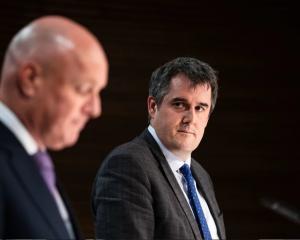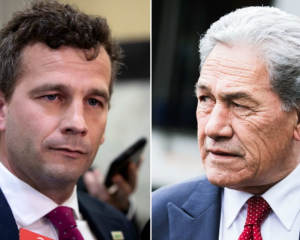Whether the Prime Minister goes the whole hog and sacks Winston Peters outright from her ministry is now largely immaterial as far as his political prognosis is concerned.
Helen Clark's decision not to remove his ministerial warrant - at least not yet - has prompted the inevitable cliches about Mr Peters escaping retribution in typically Houdini-like fashion.
The pertinent question is: escaping to where exactly? Mr Peters may have survived, but he looks more and more a spent force.
The best he can probably hope for is that New Zealand First somehow makes it back into Parliament and he negotiates some second-tier ministerial role in a fourth term Labour-led administration.
That is about as much as Labour, the rest of the body politic and voters in general could stomach after Owen Glenn's evidence to Parliament's privileges committee this week made a mockery of Mr Peters' denials that he was aware of the $100,000 donation from the wealthy benefactor towards meeting his legal bill for court action to win back his Tauranga seat from National's Bob Clarkson.
More likely, wilderness beckons - either by way of a return to the Opposition benches or annihilation as a parliamentary force altogether.
The morose looks on the faces of Mr Peters' NZ First colleagues slumped in their seats in Parliament on Wednesday afternoon suggested they realised as much that the game is up.
Mr Glenn's evidence to the privileges committee the day before has given them a massive kick in the electoral guts.
In a few short weeks they will be fighting an election campaign with their biggest asset - perhaps their sole asset - having become a massive liability.
The Peters brand is now heavily tarnished, perhaps irreparably.
His party's return to Parliament after the election now hinges on him convincing voters the shambles and subsequent investigations surrounding large cash donations to NZ First have nothing to do with him; and that rather he is the target of a conspiracy by his long-time enemies in the business world, who, along with a compliant media, are out to frustrate the democratic will, thus ensuring National can govern alone and implement a right-wing policy agenda.
The "good on yer, Winston" brigade will lap up this fanciful scenario.
But accepting such fantasy requires a leap in faith which will be a leap too far for many who might have been previously inclined to take Mr Peters seriously.
He will be forced to talk in such extremes - as he did with another full-on attack on the media yesterday - because he can no longer sell NZ First as a moderating influence on a National-led Government.
That has been rendered null and void by John Key's refusal to deal with Mr Peters.
Mr Peters' leverage over Labour - the Prime Minister is not ruling out working with him - is consequently heavily reduced.
He will be limited as to the kind of promises he can make during the campaign because it will be harder to extract the required concessions during negotiations afterwards.
It would be much easier were he still able to play Labour and National off against one another After the last election, Mr Peters was a preferred partner for Labour.
This time Labour will do its utmost to avoid dealing with him.
If the numbers dictate that Labour has no choice in the matter, Mr Peters will have some bargaining power.
If Labour is reliant on NZ First backing to govern, however, Labour will likely be equally reliant on the Greens and the Maori Party to secure a majority.
The Greens are not yet of a collective mind to feel comfortable about talks with National. The Maori Party is.
It thus has the most bargaining power because it can decamp to National.
Labour knows the choices for Mr Peters are more limited.
If he pulls the plug on negotiations - or even threatens to do so - he is consigning himself to spending what might well be his last term as an MP in Opposition.
If he props up a Labour-led Government, it is inconceivable he will again be foreign minister - and not just because he will no longer be able to name his price.
The privileges committee hearing has left him totally discredited even before the various investigations under way have reported.
Either side of the election, Miss Clark is not going to cause herself acute embarrassment by reinstating him to his foreign affairs portfolio which she took off him after the Serious Fraud Office launched its investigation into his party's handling of political donations.
She will have her fingers crossed that both the SFO investigation and a separate police one into NZ First's failure to declare an $80,000 donation from the Spencer Trust in its 2007 return to the Electoral Commission will not be completed before the November 8 election.
In case either probe clears him, she may find enough in the prior report of the privileges committee on the contempt complaint against Mr Peters to justify keeping him in limbo.
And keeping him in limbo might be the best option, rather than sacking him and he then walking out of his confidence-and-supply agreement with Labour.
She does not want to make an enemy of Mr Peters before the election campaign.
He would no doubt be sitting on enough ammunition from three years working with Labour to give Miss Clark major aggravation.
However, the widely-held view that Mr Peters has somehow escaped punishment may force her hand.
Playing for time - or "watching developments" as she prefers to call it - Miss Clark is now waiting until Mr Peters' lawyer, Brian Henry, reappears before the privileges committee on Tuesday.
In the interim, a One News-Colmar Brunton poll this weekend should offer the first real measure of whether Labour is being seriously damaged by its continuing association with Mr Peters.
She will be hoping her announcing the date of the election will have sufficient oomph to be a circuitbreaker in shifting the focus away from Mr Peters and back to the tussle which really matters - that between the two major parties.
Labour's association with Mr Peters will atrophy as the parties shift into election mode and the business of governing is suspended.
Miss Clark's difficulty is that her intention to fight the election campaign on "trust" immediately raises questions about her having trusted Mr Peters.
The December 2005 email which Mr Henry sent to Mr Glenn containing details of his bank account immediately after the business tycoon had been talking to Mr Peters is grounds enough to sack Mr Peters.
He and Glenn must have been talking about money. It is not just a reason she could sack him. It is a reason she should sack him.
Miss Clark will sack Mr Peters if she feels such symbolism is required to show she no longer trusts him.
With National spurning Mr Peters, she can hope that he might need her more than she needs him after the election. Beforehand, it is every man or woman for himself or herself.
John Armstrong is The New Zealand Herald's political correspondent.












